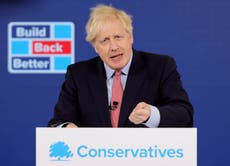Will house prices crash when furlough ends?
Looming job losses expected to drive house prices down, but just how much remains unclear

Your support helps us to tell the story
From reproductive rights to climate change to Big Tech, The Independent is on the ground when the story is developing. Whether it's investigating the financials of Elon Musk's pro-Trump PAC or producing our latest documentary, 'The A Word', which shines a light on the American women fighting for reproductive rights, we know how important it is to parse out the facts from the messaging.
At such a critical moment in US history, we need reporters on the ground. Your donation allows us to keep sending journalists to speak to both sides of the story.
The Independent is trusted by Americans across the entire political spectrum. And unlike many other quality news outlets, we choose not to lock Americans out of our reporting and analysis with paywalls. We believe quality journalism should be available to everyone, paid for by those who can afford it.
Your support makes all the difference.House prices in the UK have hit a new record high of £227,826 on average, but economists, financial institutions and others within the property market have warned that this could fall as the government’s furlough scheme comes to an end this week.
According to Nationwide Building Society, annual house price growth reached a five-year-high in October, rising 0.8 per cent month-on-month since January 2015.
The unexpected mini boom in the property market was boosted by people searching for homes with more space amid the coronavirus pandemic, as well as home buyers looking to beat the stamp duty holiday, which ends next March.
The stamp duty break covers the first £500,000 of a property purchase until the end of March 2021, giving home buyers a maximum saving of £15,000.
Historically, rises in unemployment result in falls in house prices. In 1993, when unemployment in Britain rose to about 10.5 per cent, house prices fell by 20 per cent. After the 2008 financial crisis, unemployment rose to about eight per cent and was associated with another 20 per cent dip in house prices.
In the three months to August this year, the unemployment rate stood at 4.5 per cent, equivalent to around 1.5 million people out of work. Although the housing market has appeared to buck against the trend of falling as unemployment rises, a further cull in jobs means fewer people who can afford a mortgage.
The end of the furlough scheme on 31 October is expected to trigger a landslide of job losses, and Nationwide’s chief economist cautioned that property market activity will likely slow down in the coming months as the labour market weakens.
Robert Gardner said: “The outlook remains highly uncertain and will depend heavily on how the pandemic and the measures to contain it evolve as well as the efficacy of policy measures implemented to limit the damage to the wider economy.
“Behavioural shifts as a result of Covid-19 may provide support for housing market activity, while the stamp duty holiday will continue to provide a near term boost by bringing purchases forward.
“However, activity is likely to slow in the coming quarters, perhaps sharply, if the labour market weakens as most analysts expect, especially once the stamp duty holiday expires at the end of March,” he added.
In September, the Centre for Economics and Business Research predicted that house prices will fall by almost 14 per cent next year, with property values expected to start falling “significantly” towards the end of this year.
“The temporary nature of the tax reduction means that the policy’s short term effects could be even more dramatic, as people rush to complete transactions before the return to the previous stamp duty regime at the end of March 2021,” said Cebr.
Russell Galley, managing director at Halifax, said there is plenty of uncertainty surrounding the housing market’s outlook, adding it is “very unlikely that the housing market will continue to remain immune to the economic impact of the pandemic and we believe that significant downward pressure on house prices should be expected at some point in the months ahead”.
International estate agency Hamptons International has a similar prediction. In its September forecast report, it expected housing prices to rise 2.0 per cent in 2020, bu to stagnate in 2021.
Aneisha Beveridge, head of research at Hamptons International, said: “The real challenges won’t be felt until 2021. The economic consequences from the Covid-19-induced recession will pull the housing market from its long-term growth trajectory. While some economic recovery should have taken place to cushion the withdrawal of government support, we still expect the housing market to slow next year."
The end of the furlough scheme also coincides with the end of free overdrafts and mortgage holidays, which were measures put in place by the financial services industry to help customers during the crisis.
The government’s fiscal watchdog, the Office for Budget Responsibility (OBR), said in its July fiscal sustainability report that in its most optimistic “upside scenario”, house prices will fall by just two per cent for 2020, followed by a rapid recovery to pre-crisis trends.
However, if unemployment reaches an all-time high, the OBR predicts house prices will fall by 22 per cent in 2021, followed by a period during which prices remain around 10 per cent below the trend anticipated in March this year.
In its analysis of the OBR report, think-tank Resolution Foundation also noted that in the past, interest rate falls led to an increase in real house prices. “However, with interest rates close to zero, the significant interest rate cuts that boosted house prices during previous recessions cannot be repeated today,” it added.






Join our commenting forum
Join thought-provoking conversations, follow other Independent readers and see their replies
Comments